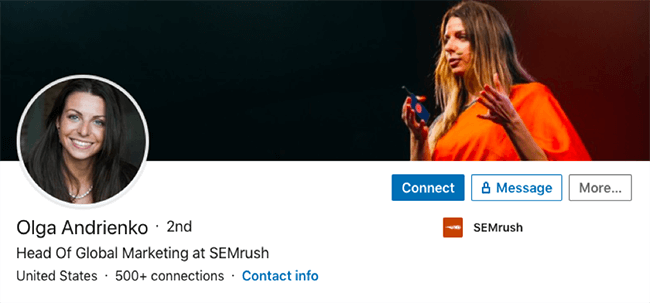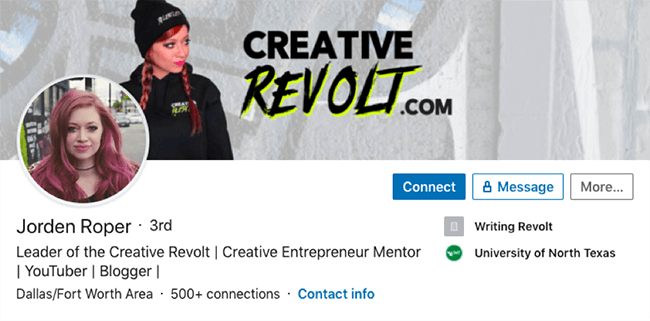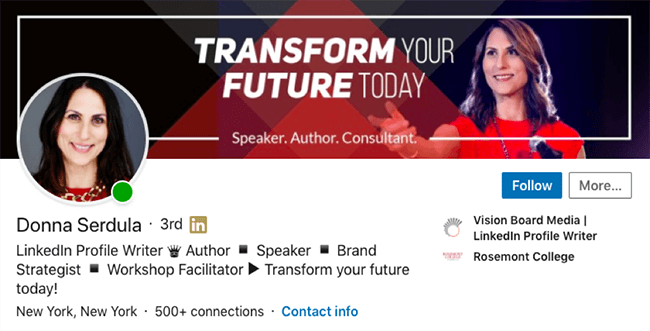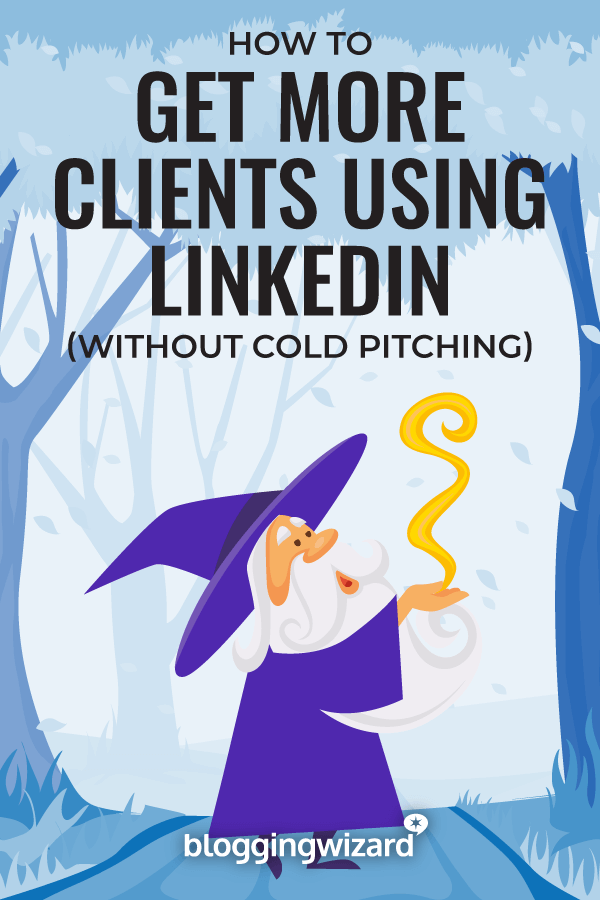How To Get More Clients Using LinkedIn (Without Cold Pitching)

So you have a LinkedIn profile.
Everything is set up, yet you’re having trouble getting clients.
What gives?
Take a look at your connections and ask yourself, how many of these professionals have I actually interacted with after connecting with them?
Many believe LinkedIn is all about pressing the connect button, but this is only part of the process.
The key is to actively connect with other LinkedIn members.
You might be wondering how to actively connect with Linkedin members.
In this post, we’ll cover what this process looks like while answering the following questions:
- How can I make my LinkedIn profile look professional?
- Are there other ways to engage with LinkedIn members without cold pitching?
- How do I get more involved in the LinkedIn community?
How do I actively connect with LinkedIn professionals?
First, understand the difference between a LinkedIn profile and an optimized LinkedIn profile.
A LinkedIn profile means your page is filled out like a resume. You list your experience and contact info in a passive voice, and your brand isn’t incorporated into your profile.
An optimized LinkedIn profile is set up for your future clients. Your brand is implemented throughout the page and your copy tells clients what you can do for them and how they can contact you.
Once you’ve optimized your page, what’s next?
Boost your social activity and increase your social proof.
Social proof is a form of trust – if clients see others recommending your services and engaging with your content, they’ll be inclined to reach out.
Building your social proof means posting content, engaging with other professionals, and sharing your knowledge about your business niche.
Now, let’s take a look at how to optimize your LinkedIn profile and how to kickstart the networking process…
Step 1: Optimize your LinkedIn profile (above the fold)
There are 2 factors to consider when you optimize your LinkedIn page.
First, tailor your profile to your ideal client. The point of LinkedIn is to market yourself as a quality employee. Create a “client persona” and answer the following questions:
What skills are important to my employer? How much experience do they want to see? What keywords will stand out to them?
Keep these answers handy as you optimize your profile.
Secondly, allow your personality to shine on your LinkedIn page. While clients look for certain criteria on your profile, they also want to hire someone who brings something unique to the table.
Do you have past experience that stands out from other candidates? Does your header express yourself? How can you write a professional profile using your own voice?
Think through these answers as they will help you accurately represent your brand on your page.
How can I optimize my LinkedIn profile, above the fold?
Above the fold is the first section of your profile available to view as soon as the page loads. It’s crucial to optimize this section and lead clients below the fold, or the section of your profile that requires scrolling.
There are 3 important components located above the fold:
Your profile picture
Can your profile picture make or break your business?
A study showed that professionally-taken profile photos were 36 times more likely to receive a message.
To sum up this question, yes, a profile photo affects your chances of being reached out to.
Think of your LinkedIn photo as the first impression with a future client. You want to look professional, confident, and approachable.
In other words, avoid casual selfies and opt for a professionally-taken photo instead.
3 things you should consider when taking a photo are:
1. High-resolution
Use a photo with good lighting and avoid blurry uploads. A 400 x 400-pixel photo is the sweet spot.
2. A simple background
The point of your profile picture is to focus on your face. Take your photo in front of a solid background and upload a photo that only shows your face and shoulders.
3. Your facial expression
Choose a photo where you are genuinely smiling to look more approachable.
Looking for an example?

Olga Andrienko fits all three characteristics in her profile photo.
- Olga’s photo uses great lighting to create a clear, high-resolution photo.
- The background is distraction-free and her face takes up the majority of the photo.
- Olga’s facial expression is natural. She looks approachable and friendly.
Something else to consider when you choose a profile photo is your brand.

Jorden Roper uses her colored hair as a staple throughout her brand. While colored hair isn’t always seen as “professional,” she does a great job of using her hair to show her personality and deepen her brand.
Don’t be afraid to express yourself as long as it meshes well with your brand and audience.
Your headline
The headline of your profile is located under your name and tells clients what you do.
Make sure your headline is:
1. Direct
Avoid “fluff” and state your services clearly.
2. Concise
Write your headline in a sentence or less.
3. Keyword-friendly
Implement keywords tailored to your client. If you own a travel blog, use keywords such as “writer for hire” and add a link to your site.
Here’s an example of a lengthy headline:
I am an aspiring writer for hire who enjoys writing about travel and lifestyle. I’ve traveled to 20+ countries and therefore have the experience to write amazing content. Check out my website here: www.lifestyleabroad.com.
While this headline explains what you do and includes keywords, it’s long and indirect. This info is better off in the about section.
Here’s an example of the same headline using quick and concise copy:
Travel and lifestyle writer for hire – lifestyleabroad.com
This headline directly states what you do in only a few words and uses proper keywords. As stated above, it meets the criteria of being direct, concise, and key-word friendly.
Your header
Your Linkedin header is a secret weapon when it comes to optimization. It’s a perfect spot to display key info about your business and show off your brand.
3 Important Parts of a LinkedIn header Are As Follows:
1. Your logo or photo
Implement your brand and place your logo or photo of yourself in the header. This will help viewers connect your services with your brand.
2. A call-to-action
Direct your client to your services with a short CTA. This can be an eye-catching phrase or question.
3. Brand colors
Deepen your brand with colors you use for your website, logo, and other social channels.

Donna Serdula uses all three components of an optimized header.
- Donna uses a photo of herself so clients can instantly put a face to her brand.
- The CTA, “Transform Your Future Today” leaves her visitors wanting more info.
- Her brand colors are added to the design without being too messy.
Notice how Donna added her services at the bottom. This is a useful addition because clients can see her brand and services all in one photo.
Start building your header with a free graphic design platform such as Canva.
Step 2: Get social on LinkedIn
Once your LinkedIn profile is optimized, you’ll be ready to show off your page and start networking.
There are 2 tactics to keep in mind as you socialize with professionals.
First, share your knowledge about your niche. Write statuses, share articles, and keep your profile up-to-date.
Second, expand your professional bubble. If you stick to one type of client, you’ll miss out on other opportunities. With that in mind, take initiative and follow well-known influencers, fellow professionals, and other business owners you can work with.
For example, if you’re starting a B2B marketing company and want to implement a blog, it would be beneficial to connect with B2B writers.
Here are three ways to share your knowledge and expand your professional bubble:
Warm pitch
You may have heard of a cold-pitch, but what about a warm-pitch?
Unlike cold-pitching, where you reach out to strangers, warm-pitching is establishing a relationship before you reach out.
You can warm-pitch on LinkedIn by:
1. Following company pages
Show your interest and follow their company page. Keep tabs on the posts they create and share as well as other employees listed on their page.
2. Interacting with their content
Did your client post something note-worthy? Leave a comment and let them know. Do you think your followers would find value in their post? Share it to your feed.
These interactions open the door to a relationship with your client. They’ll notice your interest and may take note of your business.
The next steps are as follows:
3. Connect with their profile
You’ve shared their content and left comments and likes – take the initiative and connect with them. This way, they can see the content you post and how you relate to their niche.
4. Send a pitch
Now that you’ve built a relationship, send them your best pitch and win over a new client!
Why is warm pitching beneficial on LinkedIn?
Most employers receive a ton of messages and don’t have the time to sift through them all. Warm-pitching gives you the opportunity to show your clients interest without filling up their inbox.
Join LinkedIn groups
LinkedIn groups are communities of like-minded professionals who share ideas, post questions, and ask for feedback.
You’ll get the most value out of a LinkedIn Group by learning helpful skills from other members and sharing your own insight.
How do I join a LinkedIn group?
At the dropdown menu of the search bar, click on Groups and begin searching. Search for phrases and keywords that match your criteria.
If you’re a small-business owner, type in a phrase like, “entrepreneur small business” to find groups within that niche.
I joined a group, now what?
Once you join a LinkedIn Group, post a brief introduction about yourself. Include your name, what you do, and why you joined the group.
You can write something along these lines:
Hello everyone. My name is Jessica Pereira and I’m a Digital Marketing freelance writer. I joined this group in hopes to learn more about how to help others grow their business. I’m excited to learn from you all!
The point of writing an introduction is to let others know your name, what you do, and why you joined the group.
Feel free to throw in a fun fact about yourself to show other interests you have.
LinkedIn group etiquette
As you begin to join LinkedIn Groups, you’ll notice how most emphasize the “No spamming” rule. Groups are not meant to advertise your business. In fact, they’re made to get away from that area of business.
Be mindful of this rule and get to know your fellow group members instead. Participate in discussions, share content you’ve created, and give feedback. The goal is to expand your network by sharing information that is useful for others.
Although advertising is a big no-no, LinkedIn Groups are still a great way to reach out to clients by warm-pitching.
As you continue to interact with members, you’ll most likely find a few potential clients along the way. Get to know them, read the content they share, and take note of how you can help their business.
Once you’ve established a relationship, reach out to them (outside of the group) and pitch your services.
Post articles
You post content on your website, social media channels, and blog, why not LinkedIn?
Studies show that 70% of customers feel more connected to companies who post custom content. This means your clients will feel more confident in connecting with someone who readily shares content.
Post articles to share your knowledge about your niche and engage with your connections organically.
How can I start?
The best part about sharing content on LinkedIn is you don’t have to create new content but instead can repurpose old content from your blog.
You can repurpose your content using these 2 steps:
1. Look through your long-form content
Read through old blog posts and choose a section that’ll reach out to your LinkedIn community.
Consider sections you want future clients to see. Form your repurposed content into a thought-provoking and engaging post.
2. Add a call-to-action at the end of your post
Direct followers to your website or to your emailing list using a CTA image or link.
Once your article is ready to share, utilize hashtags to reach members outside of your network. Make sure your hashtags are relevant to your post and targeted audience.
Check your analytics
Once you’ve posted an article, go to the left-hand side of your feed and click on “Views of your Post” to check out your analytics.
LinkedIn categorizes who has viewed your post by company, job title, and location. Notice what audience you’re reaching out to.
Are they within your business niche? Did anyone outside of your connections read your post?
Take these stats and tweak your next post to further reach out to your targeted audience.
To wrap up
LinkedIn is a powerful tool that allows you to expand your business and brand amongst other professionals. While there are many different ways to improve your LinkedIn profile, the best thing you can do is think about your clients as you navigate through this platform.
There are thousands of employers out there who are waiting to hire someone like you. Take this opportunity and reach out to them using an optimized LinkedIn page and social presence.
Related Reading:

